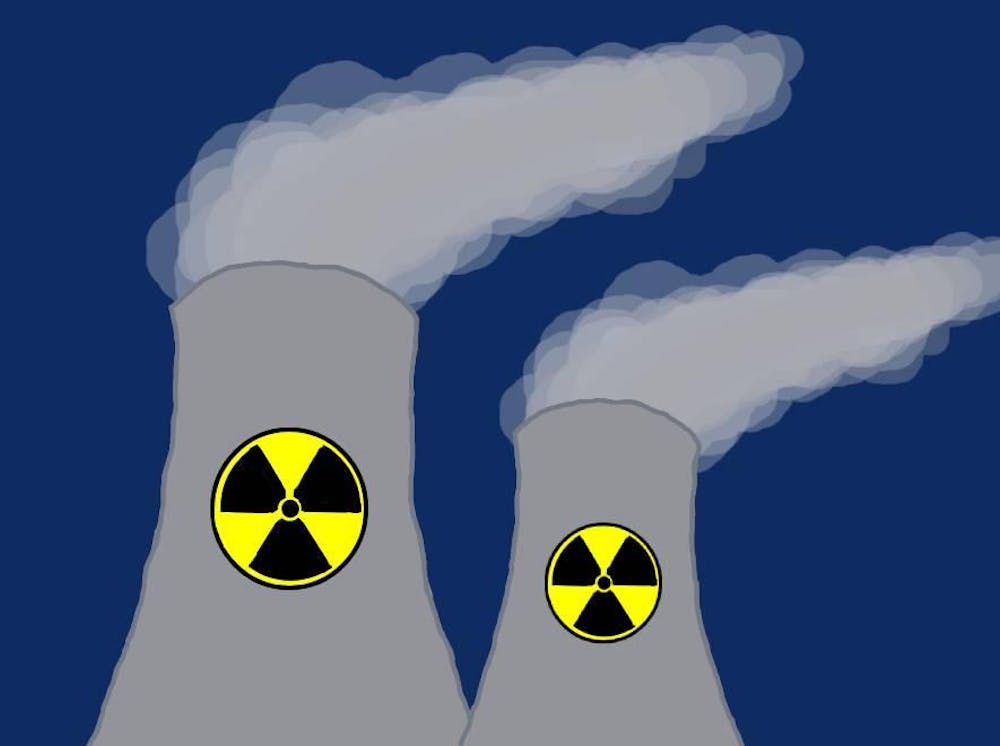Homer Simpson once said, “Lord, we're especially thankful for nuclear power, the cleanest, safest energy source there is … except for solar which is just a pipe dream.” Gov. Glenn Youngkin agreed — in July, at a press conference, he said something very similar and followed it up by recently facilitating a deal between Amazon and Dominion Energy that promises new nuclear power plants in Northern Virginia. While Youngkin has tried to frame these deals as a benefit for the economy and those in it, these plants will not actually be providing cheaper, cleaner energy for regular civilians. Instead, these are plans from which Youngkin stands to gain political capital and tax revenue. In short, Youngkin is trying to entice data centers to move to Northern Virginia for his own political gain, and presenting this to the taxpayer as a service to the citizen is deceiving.
At best, Virginians will feel the effects of this project indirectly — the primary goal of this deal was to draw new data centers, particularly Amazon’s, to Northern Virginia. These large data centers require huge sources of electricity to remain operational, and placing them near neighborhoods without building new power plants would drive electricity costs for Virginians through the roof. Thus, the so-called “Data Center Alley” is forced to bring their own power into the area, which is what this new deal will work to do.
Youngkin claims that these plants would help keep energy prices stable, but in reality, his real aim is to encourage more data centers to move into the area. While the goal of building the plants, the increase of data centers and the commitment to efficient energy sources are all laudable, the way that Youngkin has sold this idea to the public is misleading — most of the benefit will be felt by larger corporations.
In fact, the direct gains of these new plants may be nonexistent for the average Virginian. Youngkin signed a law in July allowing Dominion to use tax money to help pay for power plant construction. While it is a relatively insignificant amount of money for Virginians, it means that we are subsidizing a project that does not improve the quality of life in our communities. Even if it did help some Virginians, it would not help everyone — only the areas closest to the plants in the affluent northern area. Electricity is not being shipped across the state, and the plant’s jobs are not likely to draw workers from poorer areas of Virginia. Why should taxpayers pay for one large, wealthy company to build a power plant for another large, wealthy company?
Conversely, if these plans show no tangible benefit that someone could see on their power bill, one might argue that there might be indirect reasons to build the nuclear plants like job creation. This idea would be reasonable in many areas — but not Northern Virginia. By state, Virginia has the 8th lowest unemployment rate in the United States. By county, Virginia’s most well-employed counties are concentrated in the North. Focusing on building up the low paying jobs in an already prosperous area is a ludicrous goal. If Youngkin was truly concerned with providing higher-paying jobs to poorer areas of Virginia, there are many better spots to build these plants than in Northern Virginia. His actions contradict his rhetoric, and Virginians should not be fooled.
In short, this plan is at best neutral and at worst harmful to employment rates in Virginia. But beyond that, Youngkin has also been misleading in how he describes the feasibility of the new construction. Nuclear energy is clean, efficient and safe — but in this case, it is not cheap and, thus, is not a sure thing. Youngkin has tended to focus on the future and bringing Virginia into the next generation of energy which requires making Virginian energy competitive. Rhetoric like this is certainly inspirational, but it is by no means realistic.
For example, Youngkin has promised Dominion a small modular reactor. China and Russia are the only places with SMRs as of now, and when Utah tried to build one, the costs soared to $10 billion, leading to the scrap of the project. SMRs are certainly innovative, but they come with an expensive, inherent risk of failure — something that Youngkin conveniently forgets to mention in his address on the future of Virginian energy.
Despite risks, Virginia could benefit from more nuclear power plants, but the current proposal that Youngkin advertises hardly achieves its promised benefits, something which could be remedied by being more transparent about the actual benefits. If Youngkin explained the potential downsides of the new plants, he could ease concerns that the project is not feasible. Indeed, nuclear power can be a sustainable solution in Northern Virginia, especially in a time when Artificial Intelligence calls for more power than ever. However, taxpayers have a right to know the full details of the projects their government is approving. Mr. Burns from “The Simpsons” may be secretive about the operation of his nuclear power plant, but Youngkin need not, nay, should not be.
Paul Kurtzweil is a senior associate opinion editor who writes about economics, business and housing for The Cavalier Daily. He can be reached at opinion@cavalierdaily.com.
The opinions expressed in this column are not necessarily those of The Cavalier Daily. Columns represent the views of the authors alone.







